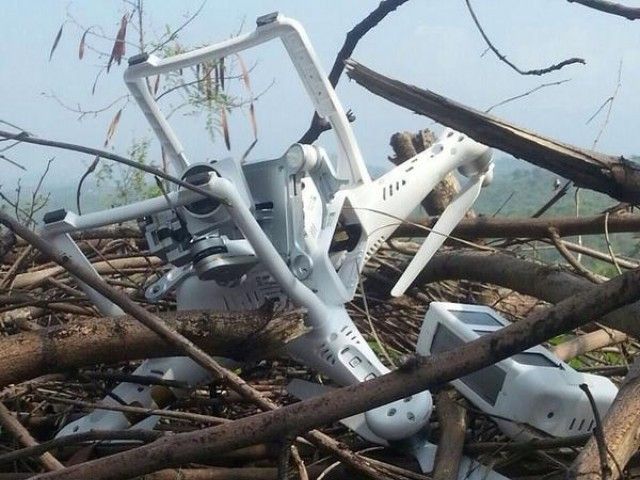Spy Versus Spy: Of Pakistani Pigeons And Indian Drones
Pigeons and drones

NEW DELHI: The internet had a field day when news broke a few weeks ago regarding the intercepting of a Pakistani “spy” pigeon. The Pakistanis had their turn on Wednesday, when an alleged Indian spy drone was shot down along the Line of Control (LoC) in Bhimber, Pakistan-held Kashmir.
Pakistan’s Dawn News reports: “According to the military, the drone had violated Pakistani airspace after which it was targeted by Pakistani forces and brought down for "violation of Pakistan's territorial integrity". The military maintains that the 'spy drone' is used for aerial photography.”
(Image credit: Daily Pakistan)
In the meanwhile, in India, we wonder what became of the “Pakistani” pigeon that was intercepted by authorities on May 29, 2015. The pigeon, believed to have crossed over from Pakistan, was discovered by 14-year old boy in Pathankot, Punjab, some 4km from the India-Pakistan border.
The boy rushed to hand over the “spy” pigeon to police, who became suspicious after seeing a message in the Urdu language and numbers that police believed were part of a landline telephone number in Pakistan’s Narowal district.
The bird was sent to get x-rayed for more clues, but nothing more -- it seems -- was found. The Times of India quoted Pathankot senior superintendent of police (SSP) Rakesh Kaushal saying, “Nothing adverse has been found, but we have kept the bird in our custody.” “This is a rare instance of a bird from Pakistan being spotted here. We have caught a few spies here. The area is sensitive, given its proximity to Jammu, where infiltration is quite common,” he added.
Although it should be a matter of reassurance for Indian security forces that despite technological advances, Pakistan’s choice of spy mode is a pigeon -- the incident placed India as the butt of jokes amongst Pakistani social media users.
Interspersed between these two incidents of “spying” is a major development in India-Pakistan bilateral ties. Last week, Indian Prime Minister Narendra Modi accepted -- for the first time -- an invitation by his Pakistani counterpart Nawaz Sharif to visit Pakistan.
Relations between India and Pakistan have been strained off late, with the sit-down meeting at the sidelines of the Shanghai Cooperation Organization summit in Ufa, Russia, being the first of its kind between the two leaders in over a year. According to an Indian publication, the request for the meeting was initiated by New Delhi. Indian Foreign Minister S. Jaishankar reportedly made a request to Pakistani Foreign Secretary Aizaz Ahmed Chaudhry through the Indian High Commissioner to Pakistan on July 3, shortly after meeting the Pakistani High Commissioner.
Tensions have been high since the last time the two leaders met one-on-one, which was at PM Modi’s swearing-in ceremony in May 2014. Efforts to conduct similar meetings, such as a meet at November’s South Asian Association for Regional Cooperation summit in Nepal, did not materialise.
Since then tensions have simmered over a range of issues. The two sides have been engaged in cross-border firing along the Line of Control, claiming dozens of life and sparking rhetoric blaming the other camp from both India and Pakistan. There was also a flare up in rhetoric after PM Modi visited Bangladesh and more recently, after India’s covert operation in Burma. Another contentious issue is the release of 26/11 blast mastermind and leader of the Lashkar-e-Taiba Zakiur Rehman Lakhvi, who was recently granted bail released from Adiala Jail in Rawalpindi in April this year. In fact, when PM Modi met Chinese Premier Xi Jinping, the issue of Lakhvi’s bail was raised.
In spite of these tensions, whilst the two Prime Ministers have not met, meetings at other levels have continued. S. Jaishankar travelled to Islamabad in March this year, where he met Chaudhry and the two reportedly discussed strategies for renewing the Indo-Pak peace dialogue.
The meeting was significant as it was the first official step since India had cancelled secretary-level talks -- that had been agreed to during Sharif’s visit for PM Modi’s inauguration ceremony -- over Pakistan’s decision to meet Kashmiri separatist leaders in August last year. Speaking at the United Nations last month, Sharif said that India’s decision to cancel the talks had resulted in a “missed opportunity.” Modi, speaking at the UN the next day, responded saying that India was not opposed to talks, but would not participate “in the shadow of terror” and that it was upto Pakistan to “create a conducive atmosphere for talks.”
Further, tensions between the two countries have been high as border skirmishes across the Line of Control that began in late 2014, continue in 2015. The firing prompted Pakistan penning a letter to UN Secretary General Ban Ki Moon that invoked the UN to implement resolutions for a plebiscite in Kashmir. The letter marked a major reversal of Pakistan’s position for over a decade, sending bilateral relations between the two countries plummeting.
However, the first sign that the situation was changing came when Pakistan’s former National Security Adviser Major-General (Retd.) Mahmud Durrani met with NSA Ajit Doval and Foreign Secretary S. Jaishankar in March. The Citizen had the reported that the meeting could be an attempt at resuming back channel diplomacy. Although the MEA spokesperson dismissed a question in regard to whether this could pave the way for the resumption of an India-Pakistan dialogue, General Durrani was quoted by The Hindu saying that his impression is that Prime Minister Narendra Modi would “like to move forward” on the dialogue, but would rather not pick up the old format of the composite dialogue process. “Mr. Modi is a different man with a different mind and a different thinking from the previous Prime Minister,” The Hindu quoted General Durrani as saying. “I think he will probably engage with Pakistan, but he would like to do that in his own way.”
Meanwhile, we await the fate of the captured pigeon and the shot-down drone.



